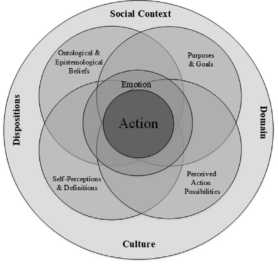The effect of the Life Sciences and Society programme on professional identity
Within the Graduate School of Life Sciences, the Life Sciences & Society (LSS) programme was developed to teach students the importance of incorporating societal perspectives into research design. By incorporating these perspectives, these students can increase the impact of their work and meet society’s needs. To investigate the effect of the LSS programme on the attitudes of alumni towards their role as scientist in society and to investigate which learning mechanisms contributed to their professional identity formation, semi-structured interviews were used.
Background information
Life sciences is a branch of science focused on knowledge about health and disease. Nevertheless, the Dutch student body of (bio)medical/life sciences programmes is relatively homogeneous. This contrasts with the diversity that can be found in current society, leading to a gap in scientific knowledge. Promoting diversity and interdisciplinary collaboration is essential to ensure inclusive research that meets societal needs.
Project description
To address this gap, an interdisciplinary, six-month LSS programme was developed within the Graduate School of Life Sciences. This programme brings together life sciences master’s students to teach them the importance of the incorporation of societal perspectives into research design. However, we were curious to investigate what the effect was on the program on our alumni. To address the research questions, semi-structured interviews with former LSS programme participants one, two or three years after completion were conducted. Professional identity formation of alumni was studied with the Dynamic Systems Model of Role Identity (Kaplan and Garner, 2017).

Figure 1: Dynamic Systems Model of Role Identity (Kaplan & Garner, 2017)
Aims
This project aims to answer the following research questions:
- What effects did the LSS programme have on the attitudes of alumni towards their role as a scientist within society?
- What learning mechanisms contributed to their professional identity formation
Results and conclusion
Preliminary analysis shows that the view of participants on their role as scientists in society was not changed by the program, but it was reinforced. The norms and values they fostered and found important, including professional identity, became more explicit, and participants were more aware of it. Additionally, they could articulate it better. Their view on society was broadened and alumni value other fields more after following the program. The program also gave alumni more tools to put their knowledge into action.
References
- Kaplan, A., & Garner, J. K. (2017). A complex dynamic systems perspective on identity and its development: The dynamic systems model of role identity. Developmental Psychology, 53(11), 2036–2051. https://doi.org/10.1037/dev0000339
- Flanagan, J. C. (1954). The Critical Incident Technique. Psychological Bulletin, 51(4), 327.
